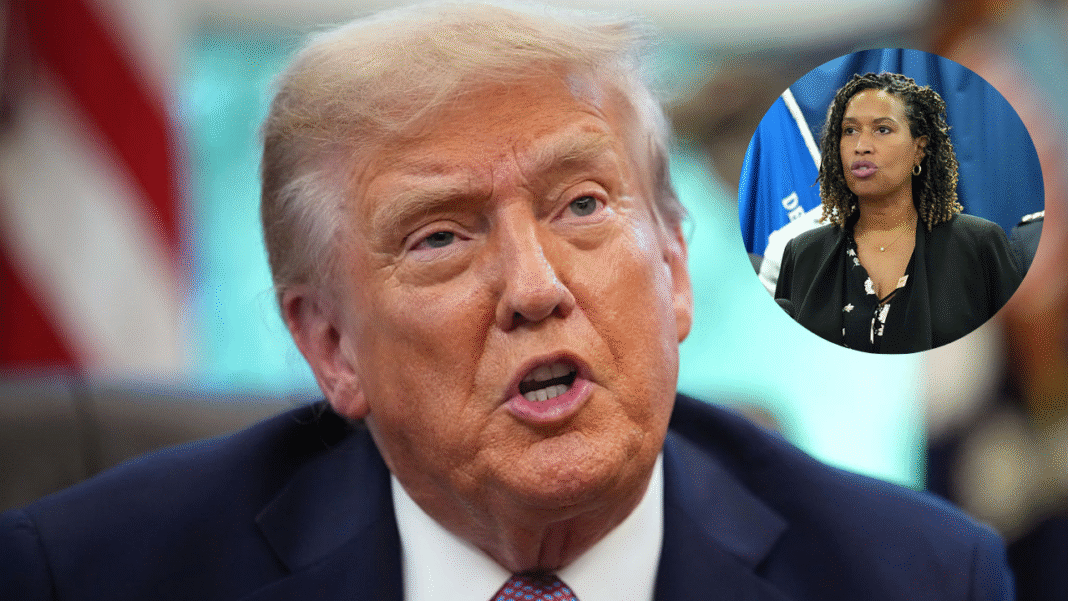Trump’s Threat to D.C.: A Political Theater or a Real Emergency?
On a recent Monday, former President Donald Trump launched a vehement criticism of Washington, D.C. Mayor Muriel Bowser, further deepening the political divide between him and local leadership. Taking to his preferred platform, Truth Social, Trump declared that Bowser’s decision to stop cooperation between the D.C. Metropolitan Police Department and ICE on immigration enforcement was a significant threat to public safety.
The Background
In his late-night post, Trump characterized Bowser’s move as a capitulation to “Radical Left Democrats.” He claimed that her tenure has ushered in “a violent criminal takeover” of the capital. The former president’s rhetoric reflects a longstanding theme of his administration, where he often paints cities governed by Democrats as unsafe and chaotic. Trump’s statements came after a dramatic declaration in which he described a “crime emergency” in D.C., enabling him to deploy federal resources and exert greater control over local police.
The Shift in Policy
Trump accused Bowser of jeopardizing public safety by halting ICE cooperation, implying that this would lead to a resurgence of crime. “If I allowed this to happen, CRIME would come roaring back,” he warned. Just weeks earlier, he activated provisions in the D.C. Home Rule Act that allowed the federal government to use local police for its purposes. This declaration triggered debates around the balance of power between local and federal authorities, particularly concerning issues of immigration enforcement and public safety.
Evaluating Crime Data
Despite Trump’s claims, local critics point out that crime rates in D.C. have been on the decline. Many see his federal emergency as little more than political theater aimed at reinforcing his narrative of lawlessness in urban areas led by Democrats. Critics argue that this narrative serves to bolster his base while steering attention away from the realities on the ground, where record-low crime data contradicts Trump’s dire descriptions.
Local Reactions
D.C. Young Democrats President Jamal Holtz articulated the concerns of many residents. He noted that citizens are feeling the burden of a militarized environment, where the presence of federal troops and ICE creates an atmosphere of fear rather than safety. “His actions are killing our city and our economy blindly,” he stated, referencing the direct impact that such policies have had on local businesses.
The Broader Implications
Beyond immediate local concerns, analysts argue that Trump’s threats resonate on a national scale. Political director Markus Batchelor from People For the American Way suggested that Trump’s maneuvers in D.C. reveal an underlying agenda focused on control and deportation rather than genuine crime reduction. His actions have raised alarms about an authoritarian approach to governance, prompting calls for local leaders to stand firm against federal overreach.
The Mayor’s Response
Mayor Bowser, though initially cooperating with Trump’s administration, has openly criticized the use of ICE agents instilling fear in D.C. communities. She described the situation as devastating for residents, stating, “I am devastated by people living in fear.” Her comments reflect a growing frustration among local leaders regarding federal tactics that seem to prioritize national immigration agendas over community safety.
A Community Divided
Trump’s recent actions and comments have illuminated a deep rift between local governance in D.C. and the federal agenda. As he threatens to further federalize control, local leaders are being pushed into a corner, driving home the point that local communities should dictate their safety procedures, not federal mandates. This ongoing conflict highlights the fragile nature of democracy, especially in diverse, urban communities that may feel marginalized in the national discourse.
As this situation continues to unfold, it remains to be seen how local leaders, residents, and the broader public will respond to these provocative assertions and potentially alarming policies from the former president. The implications for D.C. are not just about safety but about the very fabric of governance and representation in America’s capital.



